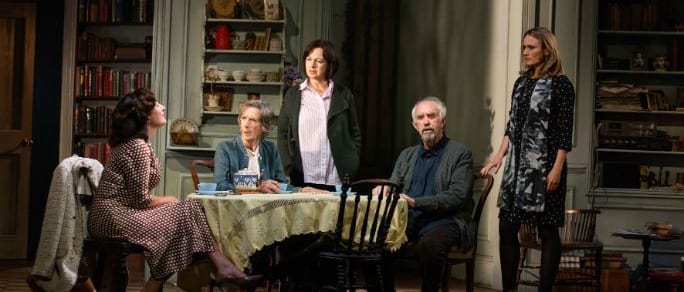It is rare for French dramatists to score a series of successes on the London stage, and yet Florian Zeller, aided by the expert translating skills of Christopher Hampton, has achieved just this. But in one way this is not a surprise. If one compares this play with the current Pinter revival season taking place nearby one sees immediately many similarities of approach that are actually very familiar. A family setting, with clearly articulated lines of affiliation, affection and tension, but any kind of familiar sequential narrative line broken up in favour of multiple perspectives, shifting viewpoints and deliberate blurring or hiding of key pieces of information. Just as with Pinter, Zeller’s plays are rarely accessible at one sitting, and repay close acquaintance.
The themes of this new play bear some comparison with his recent play ‘The Father’, even to the extent of the lead characters sharing the same name and dementia being a key theme. But the emotional matrix here is rather different. What is clear early on in the play that a death has taken place, but it is never made precisely clear who it is who has died. Is it irascible André (Jonathan Pryce) an elderly author, or is it his long-suffering wife Madeleine (Eileen Atkins)? Just at the point when you think you are clear on this fundamental point the action slides away from certainty and tilts back the other way. Maybe the whole play is a vision glimpsed through the confused mental kaleidoscope of mental decline…
What we do have here though, is a beautifully layered portrait of a long marriage in which Madeleine has indispensably managed the cantankerous André through to great success, and now they are contemplating the end-of-life, their continued ability to manage in their own home, their anxieties over their children’s relationships, and how life will be possible for him if Madeleine predeceases her husband. Above all there is the seeping anxiety over the developing symptoms of tell-tale forgetfulness and irritability that may be dementia. Wrapped around this central relationship are the peripheral but beautifully delineated dilemmas of their two daughters, summoned to deal with this mysterious death, but also juggling with choices and problems in their own personal and professional lives, in a way that is very recognisable. And finally, on the edge of things but making telling interventions, are the partner of the younger daughter, very much the awkward visitor wishing to be elsewhere, and an older, mysterious visitor who may be a former neighbour or a former lover of André.
The acting is of a superlative quality throughout. You can see why actors so much like material of this kind – so much is left under-defined or open to multiple levels of interpretation that they retain a huge degree of flexibility and variation in how a part may be delivered from one evening to another. The author has provided a frame in which the actor has vast scope to continue to re-invent the picture. Such experienced and skillful players as the two leads therefore miss no opportunity to play with the dialogue with fine degrees of emotional shading, mostly of the poignant kind, but also with rare comic skill. A brisk pace at the start dwindles to pauses and silences as the shadows lengthen. By the end of the play, which runs without a break, you feel you have traveled a long and lucid emotional journey even if you are not sure rationally what the sequence of events ever is.
But the other actors are by no means overshadowed by the central couple. Amanda Drew finds a lot of emotional anguish in the elder daughter, Anne, who is a very recognisable middle-aged figure, pulled in different directions by contradictory commitments and a life-time of trying to please rather than find her own identity. And Anne Madeley’s younger sister, Elise, finds a very plausible niche as the younger child who has always felt overlooked, and whose acts of rebellion are in part attempts to attract parental attention.
There are some flaws. Despite the work of the actors the contributions by James Hillier and Lucy Cohu seem somewhat external and grafted on, as if they are needed mainly as plot devices to open up the family unit. Moreover, though it is a short evening as things stand, one could lose a few of the shifts of perspective to advantage – there is some repetition of themes as the merry-go-round of possibilities plays its way out. That said though, it feels like a very complete psychological journey and acting of this quality commands attention and attendance.
Certainly anyone who likes Pinter will like this play.

